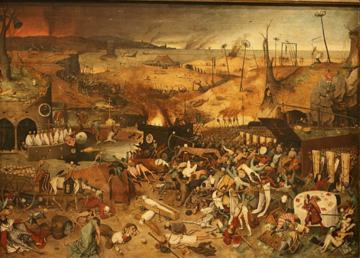Exploring Polycrises
Exploring Polycrises in the Past & Present
The numerous existential threats that modern societies face have earned the label Polycrisis – a recognition that there exist multiple, simultaneous, and interacting hazards which occur frequently enough to diminish or degrade institutional response capacity and societal resilience. Most approaches to the polycrisis highlight the ‘extraordinary’ and ‘unprecedented’ nature of current threats. While we face certain unique challenges, the perils of changing and unpredictable climate, emergent diseases, the destabilizing nature of rampant inequality, as well as the looming threat of polarization and warfare have been part of the human experience for millennia. There have been polycrises in the past just as today.

Learning the lessons history offers provides an invaluable and under-utilized path for developing strategies to navigate the myriad threats that face us now. Phase I of our CrisisDB initiative, the Consequences of Crisis research project, collected and analyzed a massive set of information on past societies, gaining unique insights into how and why crises unfolded the way they did. Building on the success of this work, in Phase II we aim to expand our insights and preliminary findings by analyzing crises in a number of modern and contemporary societies across the globe. Doing so will help to further refine our theories and models concerning the dynamics of societal crisis, and will allow us to uncover the extent (if any) that the modern world differs from the past; whether the rise of industrialized production, the globalization of commodity trade and capital markets, or the expansion of telecommunications and information technologies has changed the nature or pace of how crises arise and unfold. Our work in Phase II also focusses especially on the potential role that shifts in regional climate and local ecological shocks (droughts, floods, earthquakes, epidemics, and other threats) have in instigating or accelerating destabilizing outcomes during periods of crisis.
Key Outputs
Academic Publications
Turchin, Peter. Forthcoming. “Multipath Forecasting: The Aftermath of the 2020 American Crisis.” reprint available here: https://osf.io/preprints/socarxiv/f37jy/.
Turchin, Peter, Nina Witoszek, Stefan Thurner, David Garcia, Roger Griffin, Daniel Hoyer, Atle Midttun, James Bennett, Knut Myrum Næss, and Sergey Gavrilets. 2018. “A History of Possible Futures: Multipath Forecasting of Social Breakdown, Recovery, and Resilience.” Cliodynamics 9: 124-39. https://doi.org/10.21237/C7clio9242078.
Turchin, Peter, and Andrey Korotayev. “The 2010 Structural-Demographic Forecast for the 2010–2020 Decade: A Retrospective Assessment.” PLOS ONE 15, no. 8 (2020): e0237458. https://doi.org/10.1371/journal.pone.0237458.
Turchin, Peter, Sergey Gavrilets, and Jack A. Goldstone. “Linking ‘Micro’ to ‘Macro’ Models of State Breakdown to Improve Methods for Political Forecasting.” Cliodynamics 8, no. 2 (January 1, 2017). https://doi.org/10.21237/C7clio8237429.
Turchin, Peter. Ages of Discord: A Structural-Demographic Analysis of American History. Chaplin, CT: Beresta Books, 2016.
Lectures and Popular Media
“The History of the Near Future: What history tells us about our Age of Discord.” Keynote lecture by Peter Turchin & Daniel Hoyer at Disrupting Politics seminar
“The Historical Imperative to Get Recovery Right.” Broadbent Institute News & Blogs post by Daniel Hoyer, November 10, 2021
"A History of Possible Futures: What history tells us about our Age of Discord." Keynote lecture by Peter Turchin at the Conference on Complex Systems 2020, Jan 25, 2021
“How did the craziness of 2020 get predicted back in 2012?” Interview with Daniel Hoyer on the Scott Radley Radio show. Thursday January 7, 2021
“How did science predict the political and social unrest of 2020?” Interview with Daniel Hoyer on the Scott Radley Radio show. Wednesday June 10, 2020
"A History of the Near Future: What history tells us about our Age of Discord." Keynote lecture by Peter Turchin at the Centre for Complex Systems Studies Utrecht, Nov 14, 2019


